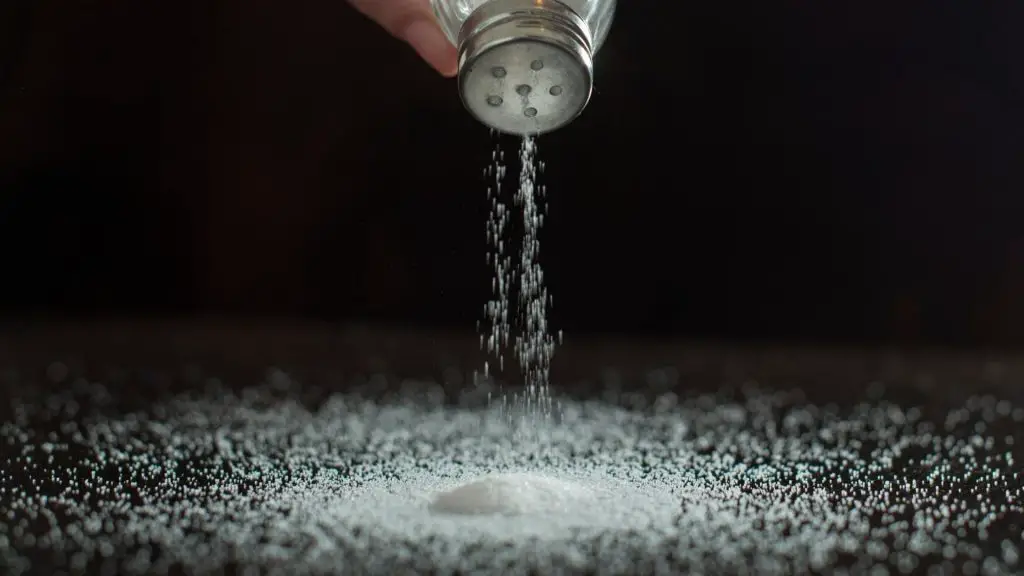Pawscessories is reader-supported. When you buy via links on our site, we may earn an affiliate commission at no cost to you.
Learn more.
You’re lying down after a long day of work, watching TV while eating your favorite bag of salt and vinegar chips.
Your dog comes over and starts giving you those big, puppy eyes. Of course, you know what your pup wants. But, before you share your chips with them, you wonder:
Can dogs eat salt and vinegar chips? Are salt and vinegar chips safe for dogs to eat?
Dogs should not eat salt and vinegar chips. The chips are high in salt, vinegar, and fat which can all harm dogs. Too much salt can lead to dehydration and electrolyte imbalances, while vinegar can irritate a dog’s digestive system. While one chip likely won’t harm your dog, avoiding giving them chips altogether is best.
In this article, we’ll discuss the dangers of dogs eating salt and vinegar chips and what you should do if your dog eats a bag of these chips while you’re out.
Let’s dive in.
Table of Contents

What Are Salt And Vinegar Chips Made With?
To understand if dogs can eat salt and vinegar chips, we need to look at what these potato chips are made of.
Let’s look at the most popular chip brand, Lays, to keep things simple.
Nutritional Facts
Per 17 chips (28 g): 160 calories, fat 10g (1.5g saturated), sodium 202mg , carbs 15g (fiber 1g, sugar 1g), protein 2g, iron 0.6mg, and potassium 320mg.
Ingredients
Potatoes, vegetable oil (sunflower, corn, and/or canola oil), salt & vinegar seasoning (maltodextrin, natural flavors, salt, malic acid, and vinegar).
Can Dogs Eat Salt And Vinegar Chips?
Now that we know what salt and vinegar chips are made of, can dogs eat them?
Salt and vinegar chips contain little to no nutritional value for dogs.
Dogs should not eat salt and vinegar chips. Although one or two chips may be safe for them to eat in moderation, it’s not recommended.
The high salt content can be dangerous for dogs and cause health problems.
Vinegar, preservatives, and other food additives in salt and vinegar chips are also not healthy for dogs.
So while your dog may beg for a chip, giving them something else is best.
Dogs who eat too many salt and vinegar chips can experience vomiting, diarrhea, lethargy, and even seizures.
If you do give your dog some salt and vinegar chips, make sure it’s only 1 or 2 and not a frequent event.

Can Dogs Eat Salt And Vinegar Pringles?
Unlike regular salt and vinegar chips, dogs can eat a small portion of salt and vinegar pringles, but it’s not recommended.
Pringles are also high in salt and can cause health problems for dogs.
They also contain the preservative MSG, which can be dangerous for dogs if consumed frequently or in large quantities.
Related Reading: Can Dogs Eat Cheetos? What You Need To Know (Vet Answers)
Is It Safe For Dogs To Eat Salt And Vinegar Chips?
A chip or two for an adult dog is harmless. But like most things, moderation is key.
Too many salt and vinegar chips can cause your dog health issues.
So, salt and vinegar chips are safe in small amounts but unsafe in large quantities.
The amount that would be considered safe depends on a dog’s size.
However, just because it’s safe for them to have 1 or 2 chips does not mean it’s in their best interest, and they should be feeding them some.
Is It Safe For Puppies To Eat Salt And Vinegar Chips?
Puppies should not eat any foods like salt and vinegar chips.
During the early stages of development, a dog requires a nutrient-rich diet.
Salt and vinegar chips provide no health benefits for puppies and are just filler foods.
In addition, puppies are tiny, so even small amounts of high fat and salty foods can be unsafe.
It can lead to dehydration and an electrolyte imbalance.
Feeding them foods like salt and vinegar chips might seem harmless, but the ramifications can be severe.
Dangers Of Dogs Eating Salt And Vinegar Chips
While one chip is unlikely to inflict any harm to your doggo, the dangers increase when feeding these kinds of treats become a frequent event.
Here are a few dangers of salt and vinegar chips:
High In Fat
Chips are high in calories and fat. There id roughly 10g of fat and 160 calories from 17 little chips. So that’s roughly 10 calories and 0.6g of fat per chip.
Eating chips often can cause obesity and weight gain in dogs. If they eat them too frequently or consume large quantities, this will eventually lead to health problems such as diabetes, joint pains, heart disease, and pancreatitis.
High Salt Content

Salt is harmful to dogs. The high amounts of salt in salt and vinegar chips are not suited to a dog’s body.
17 chips contain 202mg of salts. Although salt is needed for a dog to be healthy, it’s minimal compared to humans.
In addition, dog food will already contain the necessary amount of salt a dog requires daily. So any additional salt is not needed.
The American Heart Association says a dog’s daily sodium intake should be less than 100 milligrams. Now of course, the size of a dog matters with this calculation. Bigger dogs can handle more salt than smaller dogs.
Salt toxicity can occur when a dog eats 2 to 3 grams of sodium for every kilogram of body weight. This is equivalent to about 0.35 to 0.53 teaspoons of salt for every 2.2 pounds of body weight.
The common signs of salt poisoning include:
- Weakness
- Excessive thirst
- Diarrhea
- Vomiting
- Muscle tremors
- Seizures
Dangerous Additives
Many chips, including salt and vinegar chips, contain harmful additives that can be dangerous for dogs. These include:
- Salt & Vinegar Seasoning
- Monosodium Glutamate (MSG)
- Artificial Flavors
- Artificial Colors
While these ingredients might not immediately harm your dog, they have long-term effects that can lead to health problems. For example, MSG has been linked to headaches and migraines in humans, and dogs may experience these same effects.
While MSG is considered safe for humans, MSG is dangerous for dogs.
Overeating
Dogs that eat too many salt and vinegar chips are at risk for developing health problems like bloat, diabetes, cavities/teeth issues, obesity, or pancreatitis.
Pancreatitis is an inflammation of the pancreas that can be fatal if not treated quickly.
After overeating fatty foods like chips, dogs can develop pancreatitis.
Some symptoms of this disease in canines are:
- Vomiting
- Diarrhea
- Lethargy
- Decreased Appetite
- Abdominal Pain
In severe cases, pancreatitis can lead to organ failure and death. Therefore, you must visit the veterinarian as soon as possible if you believe your dog has pancreatitis.
Excessive Vinegar
While vinegar is safe in small quantities, too much can harm dogs.
Vinegar is an acidic substance that can irritate a dog’s digestive system.
It can also cause problems like diarrhea, vomiting, inflamed mouth and esophagus, and cause tooth decay.
You might have heard that apple cider vinegar (ACV) can benefit dogs.
There have been reports of dogs who have benefited from a moderate intake of ACV. However, there is no science to back these claims.
I spoke with Dr. Littlejohn and reached out to some vets at Vin.com, and they all said the same thing.
“Some clients have used ACV and seen improvement with their dogs. However, no scientific proof supports any claims that it’s beneficial for dogs to consume.”
Lastly, dogs can also be allergic to vinegar, so be careful when giving them some for the first time.
Can Salt And Vinegar Chips Kill Dogs?
Salt and vinegar chips are unlikely to kill dogs. They would need to eat a substantial amount of chips to be fatal.
The concern is more significant for smaller dogs since the amount required to harm them is significantly less than for bigger dogs.
If a dog gets into a big bowl of salt and vinegar chips, it may be fatal.
Salt poisoning, food bloat, or pancreatitis could occur from overeating salt and vinegar chips, all of which can be fatal.
Related Reading: Can Dogs Eat Ritz Crackers? Everything You Need To Know
What To Do If Your Dog Eats A Bag Of Salt And Vinegar Chips?

After speaking with Dr. Littlejohn, there are some key tips you can follow when your dog overeats to identify any issues.
The first step is to identify how much they ate and if it’s a concerning amount. It’s essential to know how much they consumed to better assess the severity of the situation and if you need to take them to the vet immediately.
The size of your dog will also help determine how much they can consume before it becomes a problem. Larger dogs can handle much more food than smaller dogs.
If you don’t think your dog ate enough to visit the vet, you can monitor them at home for any signs of distress.
Some things to look for would be:
- Vomiting
- Diarrhea
- Lethargy
- Excessive Thirst
It’s essential to keep an eye on your dog and monitor their behavior for the next 24-48 hours after they’ve overeaten. This will help you catch any issues that might arise so you can get them the treatment they need.
If they continue to display any symptoms after 48 hours, it would be best to take them to the vet as soon as possible.
Other Frequently Asked Questions
Can Dogs Eat Salted Chips?
Dogs should not eat salted chips, but small amounts are unlikely to cause harm.
Salted chips can cause health problems when consumed too frequently or in large amounts.
Some issues that could develop are dehydration, electrolyte imbalance, and sodium poisoning.
Can Dogs Eat Vinegar?
A dog allergic to vinegar may vomit, scratch uncontrollably, or have a similar apparent reaction.
Long-term vinegar consumption can affect dogs that are sensitive to it. There have been links to tooth decay, bone deterioration, and inflammation of a dog’s mouth and esophagus.
Other posts you might find interesting:
Can Dogs Eat Rice Krispie Treats? Is It Safe? (We Asked A Vet)
